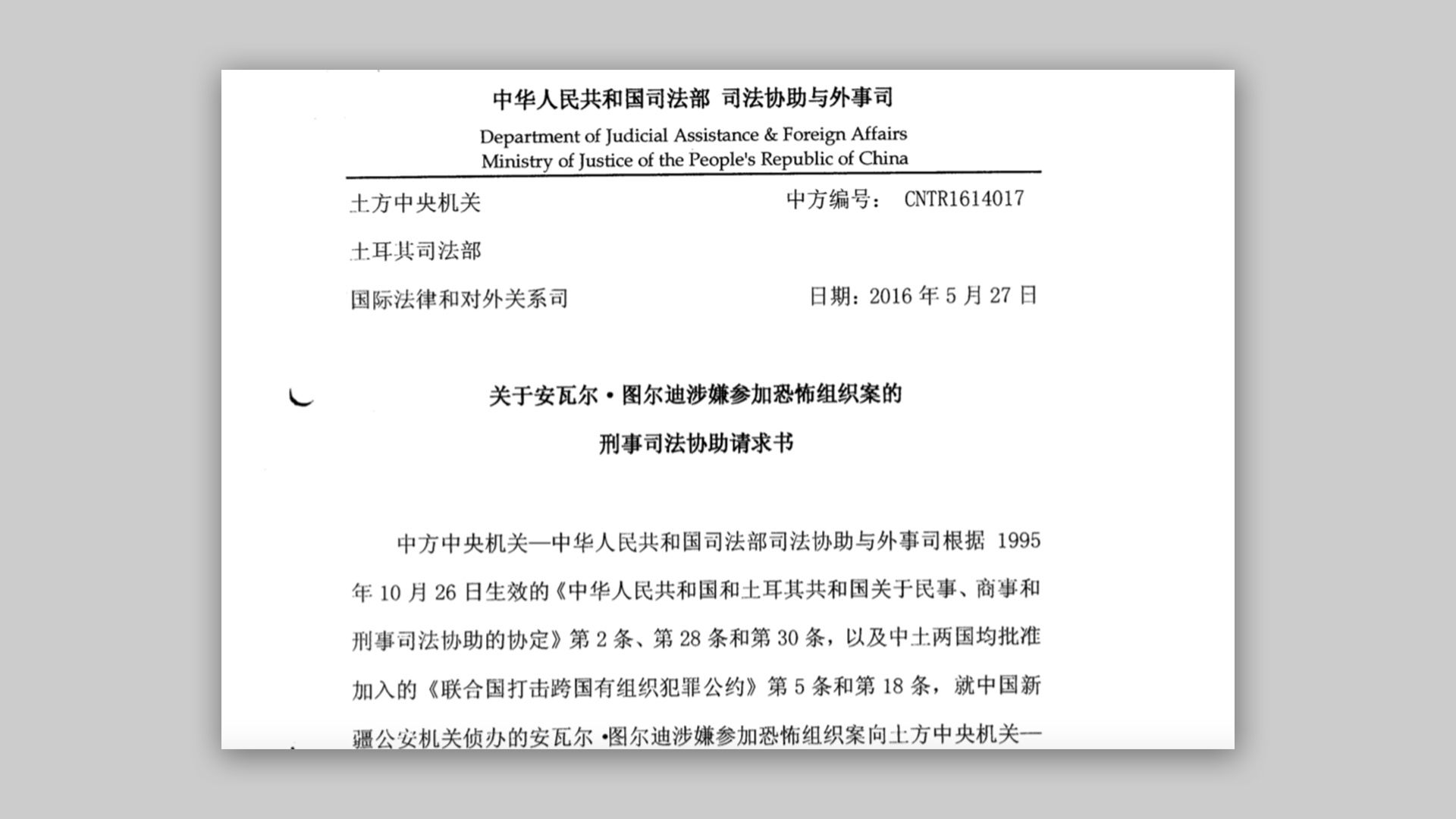Image credit: Axios/Aïda Amer.
Axios has obtained a Chinese government request sent to the Turkish government for a Uighur man who fled Xinjiang amid worsening repression.
Why it matters: Uighurs living outside China have long suspected that Beijing is using its growing diplomatic and economic clout to pressure foreign governments into interrogating and deporting them.
- These documents from 2016 and 2017 — together with Turkey’s treatment of the man after that — provide rare proof this is happening.
“I spend most of my nights in fear. I usually don’t sleep until after 1am because I am afraid they will come for me and my family.”
— Enver Turdi, in an interview with AxiosDetails: Enver Turdi, the man named in the extradition request, has lived in Turkey since early 2014 when he fled Xinjiang, a region in northwest China that is home to around 10 million Uighurs, a Turkic-speaking ethnic minority.
- In 2012 and 2013, Enver passed along information about Chinese government abuses to Radio Free Asia and to Uighur organizations abroad, he told Axios in an interview. He left China on a tourist visa after one of his associates was detained.
- In 2015, the Chinese Embassy in Turkey refused to issue him a new passport, without which he could not renew his Turkish temporary residence permit, Enver told Axios. In 2017, he was placed in a deportation facility for 12 months after being unable to produce valid residence documents.
- Turkish security officials then interrogated him and claimed that he had been running a pro-Islamic State website, which he denied, and showed him a copy of his 2004 graduation photo, which Enver says they could only have obtained from China. His case was sent to a criminal court, not an immigration court.
Enver’s case is still pending in the Turkish courts.
Background: The Chinese Communist Party has placed heavy restrictions on Uighurs and other majority-Muslim ethnic groups in western China.
- In early 2017, the Chinese government began putting hundreds of thousands of Uighurs into extrajudicial mass detention camps, where detainees are kept in dire conditions and forced to attend re-education classes. Many others receive long prison sentences without fair trials.
- The Chinese government has said its measures in Xinjiang are intended to fight terrorism and extremism, but academics and human rights groups say what’s happening is a cultural genocide on a scale not seen since World War II.
The documents: The dossier is 92 pages long and includes the Chinese government extradition request, dated May 2016, supporting police reports, Turkish translations provided by the Chinese government, and Turkish government documents from 2017 indicating the request was accepted by the Turkish Ministry of Justice and that court proceedings were initiated.
- Enver’s lawyer obtained the dossier in early 2020, the first time that Enver says he knew for sure that the Chinese government was behind his troubles in Turkey.
- To authenticate the documents, Axios consulted experts on Chinese and Turkish law, human rights groups who work on cases in Turkey and China, and researchers who focus on Xinjiang.
What they’re saying: The Chinese government accused Enver of creating a pro-Islamic State website and participating in a terrorist organization. Enver denies these accusations.
- Beijing asked Turkish authorities to discover Enver’s whereabouts, seize or freeze his assets, arrest him, and “repatriate him to China.”
- The documents themselves aren’t formally marked as classified, but the Chinese government instructed Turkish officials to keep the case a secret, writing, “The details of this case are classified, we ask the Turkish side to keep it confidential in accordance with local laws.”
The Chinese Embassy in Washington, D.C., did not respond to a request for comment.
Context: After thousands of Uighurs left China amid worsening repression over the past decade, the Chinese government launched a quiet global campaign to force Uighurs to return.
- Some countries, including Egypt and Thailand, have sent dozens of Uighurs back to China. Those who returned often disappeared. Some have reportedly died.
- “The lengths that China will go to control Uighurs is stunning,” said Elise Anderson, a program officer at the Uighur Human Rights Project, a U.S.-based advocacy organization, told Axios.
- After the rise of the Islamic State, which a small number of Uighurs joined, the Chinese government has increasingly framed Uighur religious and cultural activity as dangerous extremism. One official list of signs of “religious extremism” included “distorting Xinjiang history,” “young men wearing long beards” and “closing restaurants during Ramadan.”
“China puts pressure on Turkey, and Turkey has to jump through hoops.”
— Emma Sinclair-Webb, Turkey director at Human Rights Watch, in an interview with Axios.The view from Ankara: Prior to 2017, the Turkish government openly welcomed Uighurs fleeing China, and many Turkish people feel a sense of solidarity with Uighurs.
- But warming ties between China and Turkey have seen Ankara walk back some of its support of Uighur refugees, who now say Turkish police are interrogating them and accusing them of terrorism.
The Turkish Embassy in Washington, D.C., did not respond to a request for comment.
What to watch: Turkey and China signed a draft extradition treaty in 2017, but the Turkish Parliament has not yet ratified it.
- If passed, Turkey would be obligated, with some exceptions, to abide by Chinese government extradition requests.
Go deeper: Read the documents here.
Source: Axios



